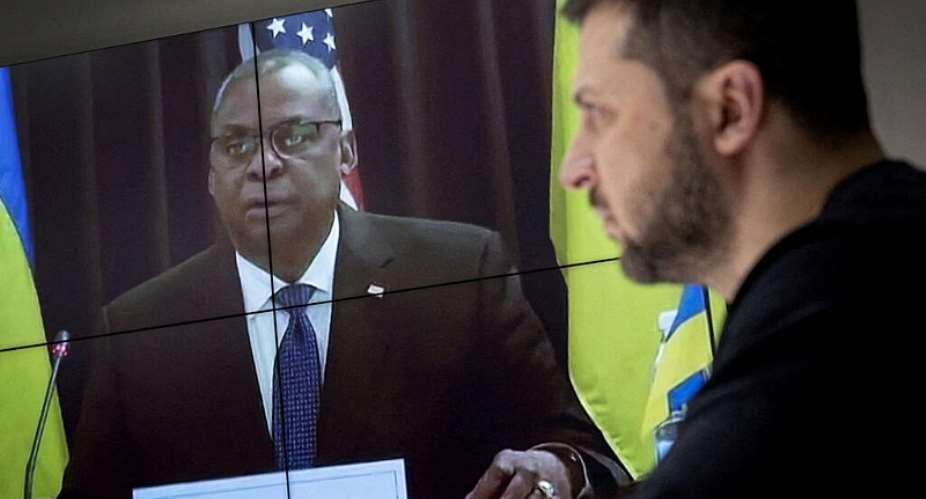Germany on Friday said no decision has been made yet on tanks sought by Kyiv at a crucial US-led meeting on boosting military aid to Ukraine, despite an emotional plea from President Volodymyr Zelensky.
Expectations grew ahead of the meeting at the Ramstein Air Base in Germany that Ukraine's Western allies would agree to send German-made Leopard tanks, amid mounting pressure from several European countries to do so.
But German Defence Minister Boris Pistorius told reporters on the sidelines of the event that "we still cannot say when a decision will be taken, and what the decision will be, when it comes to the Leopard tank".
He also denied accusations that Germany alone was blocking tank deliveries. The impression that "there is a united coalition and that Germany is standing in the way is wrong," he said.
Pistorius added that he has ordered a stock-take of Leopards so that action can follow quickly if the decision were to be positive for delivery.
Leopard tanks
Kyiv wants the powerful Leopard tanks to press offensives against Russian troops, but the Kremlin has warned their delivery by the West would amount to an "extremely dangerous" escalation.
Germany's hesitation so far on supplying the tanks has led to fierce criticism of Berlin from other countries such as Finland and Poland, which have their own stocks of Leopards but would need German approval to send them.
Zelensky on Friday renewed his plea for Western allies to "speed up" arms deliveries to Ukraine as he addressed the conference, which gathered representatives from 50 countries, via video-link.
Partners needed "not to bargain about different numbers of tanks but to open that principal supply that will stop evil", the Ukrainian leader said.
'Decisive moment'
Make the meeting a "Ramstein of tanks", Zelensky said, calling for future gatherings to "go down in history as a Ramstein of F-16s and long-range missiles".
The meeting's host, US Secretary of Defense Lloyd Austin, urged allies to "dig even deeper" to support Ukraine with weaponry at a crucial time, noting that Russia is "running out of ammunition and suffering significant battle losses".
"This is a decisive moment for Ukraine. The Ukrainian people are watching us, the Kremlin is watching us, and history is watching us," Austin said.
The Kremlin responded by accusing the West of harbouring a "dramatic delusion" that Ukraine can win on the battlefield, adding that the conflict was "developing in an upward spiral."
In the run-up to the meeting Ramstein, Western allies have offered a flurry of new arms shipments.
Finland became the latest on Friday to announce a 400-million-euro military aid package, its largest to date, and including heavy artillery as well as munitions.
It comes after allies including the United States and Britain announced substantial new arms shipments on the eve of the Ramstein talks.
The Pentagon offered $2.5 billion worth of supplies for Ukrainian forces, including Bradley fighting vehicles, armoured personnel carriers, air defence systems, and tens of thousands of rockets and artillery rounds.
But it did not include the ATA long-range missiles sought by Ukraine.
The missiles, which can travel up to 300 kilometres, could enable Ukraine to strike Russian supply routes and depots far behind the front lines that are not reachable with current HIMARS rocket systems.
But Western partners also fear that Ukraine could use long-range weapons to hit deep inside Russian territory or Crimea - a peninsula Moscow annexed in 2014 - despite Kyiv promising it would not do so.
(with AFP)





 We’ll no longer tolerate your empty, unwarranted attacks – TUC blasts Prof Adei
We’ll no longer tolerate your empty, unwarranted attacks – TUC blasts Prof Adei
 Bawumia donates GHc200,000 to support Madina fire victims
Bawumia donates GHc200,000 to support Madina fire victims
 IMF to disburse US$360million third tranche to Ghana without creditors MoU
IMF to disburse US$360million third tranche to Ghana without creditors MoU
 Truck owner share insights into train collision incident
Truck owner share insights into train collision incident
 Paramount chief of Bassare Traditional Area passes on
Paramount chief of Bassare Traditional Area passes on
 Two teachers in court over alleged illegal possession of BECE papers
Two teachers in court over alleged illegal possession of BECE papers
 Sunyani: Victim allegedly shot by traditional warriors appeals for justice
Sunyani: Victim allegedly shot by traditional warriors appeals for justice
 Mahama vows to scrap teacher licensure exams, review Free SHS policy
Mahama vows to scrap teacher licensure exams, review Free SHS policy
 Government will replace burnt Madina shops with a new three-story, 120-store fac...
Government will replace burnt Madina shops with a new three-story, 120-store fac...
